16 june 2015
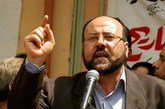
Hamas representative in Lebanon Ali Baraka has described the massive protests organized on Monday in Beirut and some Palestinian refugee camps in the country as a message to the UNRWA to go back on its decisions to reduce services.
The Hamas official made his remarks during his participation in a protest sit-in outside the UNRWA headquarters in Beirut.
"The UNRWA is responsible for providing aid and relief for the Palestinian refugees and any backward move will not be accepted," Baraka stated in a speech during the sit-in.
He expressed his belief that terminating UNRWA services in Lebanon meant that the international community unanimously decided to forsake the issue of the Palestinian refugees.
He said that the Palestinian community in Lebanon would escalate their protest steps in this regard and there would be massive marches soon to Lebanese-Palestinian border areas to pressure the UNRWA to backtrack on its decisions.
UNRWA Facing Worst Financial Crisis in 65 Years
According to an official source, the United Nations Relief and Works Agency (UNRWA) is facing a financial crisis due to a widening gap between the needs of the agency and support from donor nations, reported US News.
Jordanian Minister of State of Media Affairs Mohammad Momani said, at a UNRWA committee meeting, that a widening gap between demand and supply was the reason for what is being called the worst financial crises that has ever faced UNRWA in its 65 year history.
According to Shanghai Daily, Momani added that Jordan was ‘deeply concerned’ over the crisis, and reminded the committee that Jordan hosted the largest number of Palestinian refugees in the world.
Kuwait yesterday donated $15 million to UNRWA in a ceremony held in New York yesterday.
UNRWA Commissioner-General Pierre Krähenbühl said: “This welcome donation comes at a crucial time for UNRWA as developments in the region dramatically increase the needs of our refugees, many of whom are caught up in the civil war in Syria and who are living under blockade and occupation in Gaza and the West Bank.”
He added that there were ‘unprecedented pressures’ on the agency’s resources, and thanked the Emir and people of Kuwait for the ‘timely’ donation.
However, PNN reports that, in remarks made separately, Krähenbühl said on Monday that the plight of the refugees represented a ‘time bomb’ in the region, and blamed the ‘political failure’ of the international community in neglecting the refugee problem for so long.
Hundreds of Palestinian refugees took to the streets of Beirut on Monday to protest recent cuts in aid from UNRWA, said PressTV.
Participants in the demonstration allegedly submitted a list of demands to John Marks (Deputy Director of UNRWA Affairs in Lebanon), and expressed their concern about the threat these cuts would pose to the education of Palestinian children, as well as the construction of new camps for refugees.
The Hamas official made his remarks during his participation in a protest sit-in outside the UNRWA headquarters in Beirut.
"The UNRWA is responsible for providing aid and relief for the Palestinian refugees and any backward move will not be accepted," Baraka stated in a speech during the sit-in.
He expressed his belief that terminating UNRWA services in Lebanon meant that the international community unanimously decided to forsake the issue of the Palestinian refugees.
He said that the Palestinian community in Lebanon would escalate their protest steps in this regard and there would be massive marches soon to Lebanese-Palestinian border areas to pressure the UNRWA to backtrack on its decisions.
UNRWA Facing Worst Financial Crisis in 65 Years
According to an official source, the United Nations Relief and Works Agency (UNRWA) is facing a financial crisis due to a widening gap between the needs of the agency and support from donor nations, reported US News.
Jordanian Minister of State of Media Affairs Mohammad Momani said, at a UNRWA committee meeting, that a widening gap between demand and supply was the reason for what is being called the worst financial crises that has ever faced UNRWA in its 65 year history.
According to Shanghai Daily, Momani added that Jordan was ‘deeply concerned’ over the crisis, and reminded the committee that Jordan hosted the largest number of Palestinian refugees in the world.
Kuwait yesterday donated $15 million to UNRWA in a ceremony held in New York yesterday.
UNRWA Commissioner-General Pierre Krähenbühl said: “This welcome donation comes at a crucial time for UNRWA as developments in the region dramatically increase the needs of our refugees, many of whom are caught up in the civil war in Syria and who are living under blockade and occupation in Gaza and the West Bank.”
He added that there were ‘unprecedented pressures’ on the agency’s resources, and thanked the Emir and people of Kuwait for the ‘timely’ donation.
However, PNN reports that, in remarks made separately, Krähenbühl said on Monday that the plight of the refugees represented a ‘time bomb’ in the region, and blamed the ‘political failure’ of the international community in neglecting the refugee problem for so long.
Hundreds of Palestinian refugees took to the streets of Beirut on Monday to protest recent cuts in aid from UNRWA, said PressTV.
Participants in the demonstration allegedly submitted a list of demands to John Marks (Deputy Director of UNRWA Affairs in Lebanon), and expressed their concern about the threat these cuts would pose to the education of Palestinian children, as well as the construction of new camps for refugees.
15 june 2015
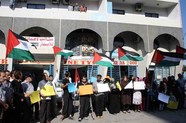
Dozens of Palestinian families displaced from Syria to Lebanon staged a sit-in outside UNRWA headquarters in the Lebanese city of Sidon in protest against the agency's decision to reduce its services.
UNRWA has earlier declared to reduce its services for Palestinian refugees and especially those who were displaced in Syria. UNRWA food supplies and financial support allocated for 1200 Palestinian families in Syria were completely stopped.
The protesters called on Palestinian factions, the PLO, and international human rights institutions to pressure UNRWA for reconsidering its recent decisions that will only affect their already deteriorating living conditions.
They also called on the donor countries to meet its financial obligations towards UNRWA.
Along the same line, UNRWA declared that Kuwait has donated US$15 million to the United Nations Relief and Works Agency, UNRWA, for its work with Palestine refugees across the Middle East.
The donation was announced at a ceremony in Geneva on 11 June, with the funds being passed to UNRWA by His Excellency, Mr Mansour Al-Otaibi, the Permanent Representative of the State of Kuwait to the UN at a ceremony held in New York today.
“This welcome donation comes at a crucial time for UNRWA as developments in the region dramatically increase the needs of our refugees many of whom are caught up in the civil war in Syria and who are living under blockade and occupation in Gaza and the West Bank,” said UNRWA Commissioner General, Pierre Krähenbühl.
UNRWA has earlier declared to reduce its services for Palestinian refugees and especially those who were displaced in Syria. UNRWA food supplies and financial support allocated for 1200 Palestinian families in Syria were completely stopped.
The protesters called on Palestinian factions, the PLO, and international human rights institutions to pressure UNRWA for reconsidering its recent decisions that will only affect their already deteriorating living conditions.
They also called on the donor countries to meet its financial obligations towards UNRWA.
Along the same line, UNRWA declared that Kuwait has donated US$15 million to the United Nations Relief and Works Agency, UNRWA, for its work with Palestine refugees across the Middle East.
The donation was announced at a ceremony in Geneva on 11 June, with the funds being passed to UNRWA by His Excellency, Mr Mansour Al-Otaibi, the Permanent Representative of the State of Kuwait to the UN at a ceremony held in New York today.
“This welcome donation comes at a crucial time for UNRWA as developments in the region dramatically increase the needs of our refugees many of whom are caught up in the civil war in Syria and who are living under blockade and occupation in Gaza and the West Bank,” said UNRWA Commissioner General, Pierre Krähenbühl.
13 june 2015
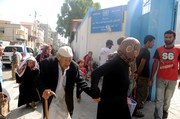
The Hamas Movement has called on the UNRWA to necessarily backtrack on its decisions to halt employment projects and shrink its services, warning that its decisions would add fuel to the flames.
"The relief and works agency for Palestine refugees, UNRWA, tends to reduce the services provided for the refugees without a UN resolution and before they are able to return to their homes in accordance with resolution 302 of the year 1949, under which the agency was established," Hamas stated in a press release on Thursday.
The Movement stressed the need for demanding the UN to compensate for the UNRWA's budget deficits resulting from the failure of donors to fulfill their pledges.
Hamas said it would organize protests to pressure the UNRWA to find solutions to its financial crisis instead of reducing services.
"The relief and works agency for Palestine refugees, UNRWA, tends to reduce the services provided for the refugees without a UN resolution and before they are able to return to their homes in accordance with resolution 302 of the year 1949, under which the agency was established," Hamas stated in a press release on Thursday.
The Movement stressed the need for demanding the UN to compensate for the UNRWA's budget deficits resulting from the failure of donors to fulfill their pledges.
Hamas said it would organize protests to pressure the UNRWA to find solutions to its financial crisis instead of reducing services.
11 june 2015

More than 1100 Palestinian refugees have been killed in Yarmouk refugee camp since the outbreak of the Syrian events in 2011, rights group said.
The documented martyrs were victims of torture, bombing, armed clashes, and the tight siege imposed on the camp for more than two years, the report clarified.
176 Palestinians were starved to death due to the accurate shortage of food and medical supplies in Yarmouk camp.
The Action Group for Palestinians in Syria (AGPS) reported that 2880 Palestinian refugees as whole were killed in Syria over the four years, in addition to thousands of missing and detained persons.
80,000 Palestinians were forced to leave their refugee camps in Syria. 28,000 refugees of them managed to reach Europe, while the rest fled to the neighboring counties amid very difficult living conditions.
The documented martyrs were victims of torture, bombing, armed clashes, and the tight siege imposed on the camp for more than two years, the report clarified.
176 Palestinians were starved to death due to the accurate shortage of food and medical supplies in Yarmouk camp.
The Action Group for Palestinians in Syria (AGPS) reported that 2880 Palestinian refugees as whole were killed in Syria over the four years, in addition to thousands of missing and detained persons.
80,000 Palestinians were forced to leave their refugee camps in Syria. 28,000 refugees of them managed to reach Europe, while the rest fled to the neighboring counties amid very difficult living conditions.
6 june 2015
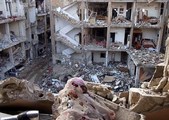
Four Palestinian refugees were reportedly killed on Friday during attacks on refugee areas and camps in Syria.
According to the action group for the Palestinians of Syria, 27-year-old Ahmed Hassouna, a resident of al-Ramel camp in Latakia died under torture after his detention for more than two years in a Syrian jail.
Another Palestinian refugee named Bahaa Abu Shaqra was killed by sniper fire near al-Raija plaza in al-Yarmouk camp.
Armed clashes between warring groups also claimed the life of another Palestinian refugee from Khan Dannun camp in southern Syria.
In Daraa, barrel bomb attacks on al- Muzeireeb area where about 8,500 Palestinian refugees are living killed one Palestinian and injured many others.
According to the action group for the Palestinians of Syria, 27-year-old Ahmed Hassouna, a resident of al-Ramel camp in Latakia died under torture after his detention for more than two years in a Syrian jail.
Another Palestinian refugee named Bahaa Abu Shaqra was killed by sniper fire near al-Raija plaza in al-Yarmouk camp.
Armed clashes between warring groups also claimed the life of another Palestinian refugee from Khan Dannun camp in southern Syria.
In Daraa, barrel bomb attacks on al- Muzeireeb area where about 8,500 Palestinian refugees are living killed one Palestinian and injured many others.
4 june 2015
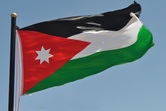
A number of Jordanian members of parliament demanded the Ministry of Interior untie its legal and administrative ties with the West Bank and consider a number of Jordanian nationals as Palestinians, Quds Press revealed.
In a memorandum presented to the parliament speaker, Atef Tarawneh, the MPs asked for citizens who lived in the occupied West Bank before 31 July 1988, those who hold green ID cards when crossing the Allenby Bridge, those who work or worked in the Palestinian National Authority, the cadres of the Palestine Liberation Organisation (PLO) excluding those who entered Jordan before 1983, those who leave the West Bank through Israeli ports under Israeli travel documents, and those who left the West Bank after 1 June 1988 amongst others be considered Palestinian and not Jordanian citizens.
The execution of this disengagement, according to the memorandum, will result in withdrawing the Jordanian nationality from more than 300,000 Jordanian citizen of Palestinian origin who have been living in Jordan since 1948.
The memorandum, which was issued under the theme of "disengagement decisions", was signed by MP Raed Al-Khalayleh, Abdul Raheem Al-Beqa'i and Nidal Al-Hiyari.
This comes after the developments that followed the FIFA presidential elections, after reports said that the head of the Palestinian Football Union, Jibril al-Rajoub, did not give Palestine's vote for the Jordanian Prince, Ali Bin Al Hussein, which was later denied by al-Rajoub in official statements.
An official document, obtained by Quds Press, a request by the Director of Monitoring and Inspection Directorate, of the Interior Ministry in Jordan, in which he asked the Director of the Civil Status and Passport Directorate to probe into the grounds that the decision to grant the President of the Palestinian Football Union, Jibril al-Rajoub, a Jordanian nationality was based on.
The document, written on June 1, 2015, under the title of "Jibril al-Rajoub, born on 1953", details the request submitted by the Director of Monitoring and Inspection Directorate to inquire about the legal basis for the decision to grant al-Rajoub a Jordanian nationality, and details of his civil registration, and any changes thereto.
The document, finished and sealed by the governor of the circuit and issued by the Jordanian Ministry of Interior, also reads urgent at its bottom.
In a memorandum presented to the parliament speaker, Atef Tarawneh, the MPs asked for citizens who lived in the occupied West Bank before 31 July 1988, those who hold green ID cards when crossing the Allenby Bridge, those who work or worked in the Palestinian National Authority, the cadres of the Palestine Liberation Organisation (PLO) excluding those who entered Jordan before 1983, those who leave the West Bank through Israeli ports under Israeli travel documents, and those who left the West Bank after 1 June 1988 amongst others be considered Palestinian and not Jordanian citizens.
The execution of this disengagement, according to the memorandum, will result in withdrawing the Jordanian nationality from more than 300,000 Jordanian citizen of Palestinian origin who have been living in Jordan since 1948.
The memorandum, which was issued under the theme of "disengagement decisions", was signed by MP Raed Al-Khalayleh, Abdul Raheem Al-Beqa'i and Nidal Al-Hiyari.
This comes after the developments that followed the FIFA presidential elections, after reports said that the head of the Palestinian Football Union, Jibril al-Rajoub, did not give Palestine's vote for the Jordanian Prince, Ali Bin Al Hussein, which was later denied by al-Rajoub in official statements.
An official document, obtained by Quds Press, a request by the Director of Monitoring and Inspection Directorate, of the Interior Ministry in Jordan, in which he asked the Director of the Civil Status and Passport Directorate to probe into the grounds that the decision to grant the President of the Palestinian Football Union, Jibril al-Rajoub, a Jordanian nationality was based on.
The document, written on June 1, 2015, under the title of "Jibril al-Rajoub, born on 1953", details the request submitted by the Director of Monitoring and Inspection Directorate to inquire about the legal basis for the decision to grant al-Rajoub a Jordanian nationality, and details of his civil registration, and any changes thereto.
The document, finished and sealed by the governor of the circuit and issued by the Jordanian Ministry of Interior, also reads urgent at its bottom.
2 june 2015
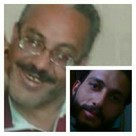
Tariq Mohammed Ismail and Muhannad Mohammed Khaled
Around eight Palestinians have been killed in Khan Sheikh refugee camp in Syria over the past month, human rights sources said Monday.
The Action Group for Palestinians of Syria said eight Palestinian refugees, from Khan Sheikh Camp, were killed including two Palestinian youths in their twenties who were tortured to death in the Syrian regime prisons.
Four other Palestinians including a mother and her daughter and son were killed after their vehicle was bombed by the Syrian regime forces while trying to leave the refugee camp, the sources added.
Two other Palestinian brothers were shot and killed by Syrian regime forces near their home in the camp.
Around eight Palestinians have been killed in Khan Sheikh refugee camp in Syria over the past month, human rights sources said Monday.
The Action Group for Palestinians of Syria said eight Palestinian refugees, from Khan Sheikh Camp, were killed including two Palestinian youths in their twenties who were tortured to death in the Syrian regime prisons.
Four other Palestinians including a mother and her daughter and son were killed after their vehicle was bombed by the Syrian regime forces while trying to leave the refugee camp, the sources added.
Two other Palestinian brothers were shot and killed by Syrian regime forces near their home in the camp.
24 may 2015
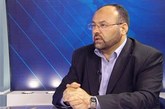
Hamas's representative in Lebanon Ali Baraka said that the Palestinian people is only specialized in confronting the Israeli occupation and has nothing to do with any regional conflicts.
During a political meeting organized by Hamas in Beddawi refugee camp in Lebanon, Baraka urged the Arab countries to stand by the Palestinian cause.
He emphasized that the Palestinian people would never be involved in any sectarian strife and would not allow their camps in Lebanon to be arenas for fights between others.
"We are people who seek to live with dignity and enjoy our civil rights in Lebanon," he stressed.
During a political meeting organized by Hamas in Beddawi refugee camp in Lebanon, Baraka urged the Arab countries to stand by the Palestinian cause.
He emphasized that the Palestinian people would never be involved in any sectarian strife and would not allow their camps in Lebanon to be arenas for fights between others.
"We are people who seek to live with dignity and enjoy our civil rights in Lebanon," he stressed.
23 may 2015
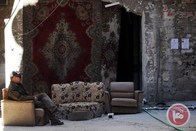
A man sits outside a bullet-ridden building in Yarmouk on April 6, 2015
Up to 13,000 refugees have fled the beleaguered Yarmouk refugee camp in recent days in fear of the Islamic State group and al-Nusra Front, a local Palestinian official said Saturday.
The secretary-general of the coalition of Palestinian factions in the camp, Khalid Abd al-Majid, told Jordanian newspaper al-Ghad on Saturday that fewer than 7,000 refugees remained in the camp. He added that these remaining refugees may be forced from the camp in coming days as well.Yarmouk -- once a thriving, working-class residential district of the capital and home to some 160,000 people -- is the largest refugee camp in Syria, but has suffered heavily during the Syrian civil war.
Since December 2012, when the first clashes broke out between Syrian regime forces and rebels, more than 150,000 Palestinian refugees have fled from Yarmouk. The camp came under a devastating 18-month long government siege after rebel forces took up positions inside, including elements of the extremist al-Nusra Front.
The camp was subsequently overrun by Islamic State militants in April, leading to further government bombardment. "It is unlikely that refugees who left the camp would be able to go back because of the ongoing armed clashes in the camp between IS and Jabhat al-Nusra," al-Majid said Saturday. He added that IS fighters have been trying to gain control of parts of the camp that are currently under the control of armed Palestinian factions.
Last week, PLO official Anwar Abdel Hadi said that while IS has been pushed to the southwest area of the Damascus district, Palestinian factions control the north and east of the camp, with "intermittent clashes" breaking out.While al-Nusra and IS are both fighting Syrian government forces, their relationship with one another inside Yarmouk remains unclear.
The former residents of Yarmouk are part of more than half a million Palestinian refugees to have suffered over the past five years of Syrian civil war. By the end of April, the UN agency for Palestinian refugees UNRWA said they had only received 20 percent of the funding required to aid Palestinian refugees in Yarmouk.
"After enduring four years of conflict, two of them under siege-like conditions, and the suffering created by armed groups, the civilians in Yarmouk are at a breaking point," the agency said. The Palestinian Authority has collected $6.4 million to support the camp through deducting a small portion of civil servants' salaries, as well as through donations from individuals and civil society organizations.
The money, however, hasn't yet been sent to the refugees "who badly need the money," al-Majid said.Many refugees who have fled Yarmouk have been accommodated in sheltering centers created by the Syrian government and supervised by UNRWA and the Syrian Red Crescent Association.
Up to 13,000 refugees have fled the beleaguered Yarmouk refugee camp in recent days in fear of the Islamic State group and al-Nusra Front, a local Palestinian official said Saturday.
The secretary-general of the coalition of Palestinian factions in the camp, Khalid Abd al-Majid, told Jordanian newspaper al-Ghad on Saturday that fewer than 7,000 refugees remained in the camp. He added that these remaining refugees may be forced from the camp in coming days as well.Yarmouk -- once a thriving, working-class residential district of the capital and home to some 160,000 people -- is the largest refugee camp in Syria, but has suffered heavily during the Syrian civil war.
Since December 2012, when the first clashes broke out between Syrian regime forces and rebels, more than 150,000 Palestinian refugees have fled from Yarmouk. The camp came under a devastating 18-month long government siege after rebel forces took up positions inside, including elements of the extremist al-Nusra Front.
The camp was subsequently overrun by Islamic State militants in April, leading to further government bombardment. "It is unlikely that refugees who left the camp would be able to go back because of the ongoing armed clashes in the camp between IS and Jabhat al-Nusra," al-Majid said Saturday. He added that IS fighters have been trying to gain control of parts of the camp that are currently under the control of armed Palestinian factions.
Last week, PLO official Anwar Abdel Hadi said that while IS has been pushed to the southwest area of the Damascus district, Palestinian factions control the north and east of the camp, with "intermittent clashes" breaking out.While al-Nusra and IS are both fighting Syrian government forces, their relationship with one another inside Yarmouk remains unclear.
The former residents of Yarmouk are part of more than half a million Palestinian refugees to have suffered over the past five years of Syrian civil war. By the end of April, the UN agency for Palestinian refugees UNRWA said they had only received 20 percent of the funding required to aid Palestinian refugees in Yarmouk.
"After enduring four years of conflict, two of them under siege-like conditions, and the suffering created by armed groups, the civilians in Yarmouk are at a breaking point," the agency said. The Palestinian Authority has collected $6.4 million to support the camp through deducting a small portion of civil servants' salaries, as well as through donations from individuals and civil society organizations.
The money, however, hasn't yet been sent to the refugees "who badly need the money," al-Majid said.Many refugees who have fled Yarmouk have been accommodated in sheltering centers created by the Syrian government and supervised by UNRWA and the Syrian Red Crescent Association.
21 may 2015
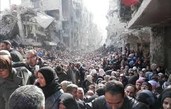
The Syrian regime forces continue to detain dozens of Palestinian women without revealing any information about their fate, names, or health situation, Action Group for Palestinians of Syria (AGPS) said Thursday.
The AGPS documentation team said that 36 Palestinian female detainees are currently held in the Syrian regime's prisons since the outbreak of the ongoing events.
The reported female detainees were kidnapped at the checkpoints erected to the entrances to Palestinian refugee camps or cities.
The rights groups pointed out that the number of Palestinian women who have been arrested during the Syrian civil war is higher than declared.
Many arrest cases were not declared for fear of the detainees’ life or for hope of their release.
Approximately 868 Palestinians are held in Syrian prisons with no information over their fate, the group added.
The AGPS documentation team said that 36 Palestinian female detainees are currently held in the Syrian regime's prisons since the outbreak of the ongoing events.
The reported female detainees were kidnapped at the checkpoints erected to the entrances to Palestinian refugee camps or cities.
The rights groups pointed out that the number of Palestinian women who have been arrested during the Syrian civil war is higher than declared.
Many arrest cases were not declared for fear of the detainees’ life or for hope of their release.
Approximately 868 Palestinians are held in Syrian prisons with no information over their fate, the group added.
20 may 2015
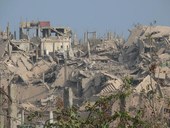
Islamic Resistance Movement, Hamas, slammed the performances of UNRWA and Lebanon in regards to the ongoing crisis of Nahr al-Bared refugee camp for eight years.
In a statement, Hamas said “after eight years of the destruction of al-Bared’s refugee camp and the displacement of its inhabitants, it seems that the reconstruction has come to a dead end due to procrastination and corruption.”
“The refugees have so far been waiting for achieving the promises of temporary displacement and soon return. They, however, have not returned or received any compensation,” the statement added.
Hamas pointed out that the reconstruction rate has not exceeded 35% whereas UNRWA decreased the aid and rent allowances last year.
Hamas also asked Lebanon to abide by its promises of reconstruction and refugee return to the camp and called for cancelling the security measures in the camp.
It also called on Lebanon to collect the money from donor countries and to pressure the UNRWA to hasten the reconstruction as well as to open investigation in wasting of money and to examine the reasons of reconstruction delay.
Hamas also asked UNRWA to tighten the measures to halt waste of the money allocated for camp reconstruction and called the international community to shoulder its responsibility in this regard.
Nahr al-Bared is a camp for Palestinian refugees in northern Lebanon. It includes 30,000 Palestinians. It was established by the Red Cross Committees in 1949 in order to provide shelter to Palestinian refugees.
In 2007, the camp became a conflict zone between Lebanese armed forces and Fatah al-Islam armed group which raided the camp. The clashes led to the migration of the camp’s inhabitants, total destruction of the camp and killing of so many people of both sides.
In a statement, Hamas said “after eight years of the destruction of al-Bared’s refugee camp and the displacement of its inhabitants, it seems that the reconstruction has come to a dead end due to procrastination and corruption.”
“The refugees have so far been waiting for achieving the promises of temporary displacement and soon return. They, however, have not returned or received any compensation,” the statement added.
Hamas pointed out that the reconstruction rate has not exceeded 35% whereas UNRWA decreased the aid and rent allowances last year.
Hamas also asked Lebanon to abide by its promises of reconstruction and refugee return to the camp and called for cancelling the security measures in the camp.
It also called on Lebanon to collect the money from donor countries and to pressure the UNRWA to hasten the reconstruction as well as to open investigation in wasting of money and to examine the reasons of reconstruction delay.
Hamas also asked UNRWA to tighten the measures to halt waste of the money allocated for camp reconstruction and called the international community to shoulder its responsibility in this regard.
Nahr al-Bared is a camp for Palestinian refugees in northern Lebanon. It includes 30,000 Palestinians. It was established by the Red Cross Committees in 1949 in order to provide shelter to Palestinian refugees.
In 2007, the camp became a conflict zone between Lebanese armed forces and Fatah al-Islam armed group which raided the camp. The clashes led to the migration of the camp’s inhabitants, total destruction of the camp and killing of so many people of both sides.
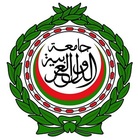
Arab League
A meeting was recently held between representatives of Arab countries that do not have diplomatic ties with Tel Aviv, and a number of Israeli officials, to discuss what they called “security cooperation” in the region.
The official Israeli Radio has reported that the meeting took place between Arab officials, Israeli security officials, and diplomats representing both the United States and the European Union.
The Radio quoted Arab officials allegedly stating that all countries in the region “must be prepared for a security situation where the United States has less influence.”
It also stated that the Arab officials “expressed willingness to advance security cooperation between all Arab Sunni states, and Tel Aviv,” but also expressed their concern that the “current stalemate in Palestinian-Israeli political talks impedes such a cooperation.”
In 2002, all Arab states in the region presented the “Arab Peace Initiative," during their summit in Beirut – Lebanon, offering full recognition and normalization with Israel should it withdraw from all the Arab and Palestinian territories it captured in the aftermath of the June 4 1967 six-day war.
The initiative was re-endorsed during the Arab Summit in Riyadh – Saudi Arabia, in 2007; however, Israel rejected it, and said it needs various amendments.
The initiative also called for a “just settlement” to the issue of Palestinian refugees, based on UN Resolution #194, by offering them their legitimate Right of Return “to live in peace with the neighbors,” and to compensate those who “do not wish to return.”
The then Israeli Prime Minister Ariel Sharon rejected the entire initiative, and claimed, “It replaces UN resolutions 242 and 338, which call for negotiations,” although Israel never officially recognized any resolution regarding its illegal occupation of Palestine.
The official Israeli stance rejects any full withdrawal from the occupied territories, including occupied Jerusalem, the Right of Return, and an independent sovereign Palestinian State.
Israel also still insists on what it calls “its right” to build and expand its illegal colonies in the occupied West Bank, including in and around occupied East Jerusalem, in direct violation of International Law and the Fourth Geneva Convention to which Tel Aviv is a signatory.
A meeting was recently held between representatives of Arab countries that do not have diplomatic ties with Tel Aviv, and a number of Israeli officials, to discuss what they called “security cooperation” in the region.
The official Israeli Radio has reported that the meeting took place between Arab officials, Israeli security officials, and diplomats representing both the United States and the European Union.
The Radio quoted Arab officials allegedly stating that all countries in the region “must be prepared for a security situation where the United States has less influence.”
It also stated that the Arab officials “expressed willingness to advance security cooperation between all Arab Sunni states, and Tel Aviv,” but also expressed their concern that the “current stalemate in Palestinian-Israeli political talks impedes such a cooperation.”
In 2002, all Arab states in the region presented the “Arab Peace Initiative," during their summit in Beirut – Lebanon, offering full recognition and normalization with Israel should it withdraw from all the Arab and Palestinian territories it captured in the aftermath of the June 4 1967 six-day war.
The initiative was re-endorsed during the Arab Summit in Riyadh – Saudi Arabia, in 2007; however, Israel rejected it, and said it needs various amendments.
The initiative also called for a “just settlement” to the issue of Palestinian refugees, based on UN Resolution #194, by offering them their legitimate Right of Return “to live in peace with the neighbors,” and to compensate those who “do not wish to return.”
The then Israeli Prime Minister Ariel Sharon rejected the entire initiative, and claimed, “It replaces UN resolutions 242 and 338, which call for negotiations,” although Israel never officially recognized any resolution regarding its illegal occupation of Palestine.
The official Israeli stance rejects any full withdrawal from the occupied territories, including occupied Jerusalem, the Right of Return, and an independent sovereign Palestinian State.
Israel also still insists on what it calls “its right” to build and expand its illegal colonies in the occupied West Bank, including in and around occupied East Jerusalem, in direct violation of International Law and the Fourth Geneva Convention to which Tel Aviv is a signatory.
14 may 2015

The Action Group for Palestinians of Syria (AGPS) affirmed that 91 Palestinian refugees were executed in Syria since the outbreak of the ongoing bloody events.
The 91 victims were executed at hands of the Syrian regime forces and the opposition armed groups, the group said in its report.
The report stated that a 27-year-old Palestinian refugee, from Yarmouk camp, was tortured to death in Syrian regime prisons.
Meanwhile, Yarmouk camp is still witnessing a state of tension that has been prevailed following ISIS's savage attack on the camp in early April.
The report also pointed out that the neighboring areas of Khan Sheikh Refugee camp were subjected to brutal bombing by the Syrian regime warplanes.
The residents of the camp suffer very poor living condition due to the acute shortage of food supplies, medical equipments, and fuel.
The 91 victims were executed at hands of the Syrian regime forces and the opposition armed groups, the group said in its report.
The report stated that a 27-year-old Palestinian refugee, from Yarmouk camp, was tortured to death in Syrian regime prisons.
Meanwhile, Yarmouk camp is still witnessing a state of tension that has been prevailed following ISIS's savage attack on the camp in early April.
The report also pointed out that the neighboring areas of Khan Sheikh Refugee camp were subjected to brutal bombing by the Syrian regime warplanes.
The residents of the camp suffer very poor living condition due to the acute shortage of food supplies, medical equipments, and fuel.
13 may 2015
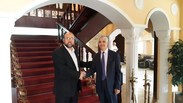
The representative of Islamic Resistance Movement, Hamas, in Lebanon Ali Baraka called for neutralizing Palestinian refugee camps from the regional conflict in Beirut on Wednesday.
This came in the meeting held between Hamas representative Ali Baraka and the Algerian Ambassador to Lebanon Ahmad Bouziane in which they held talks on the security conditions of Palestinian refugees in Lebanon.
The Hamas official Ali Baraka said, in a statement on Wednesday, that he visited the Bouziane in Beirut and discussed with him the latest developments on the Palestinian Question.
They stressed the necessity to protect the Palestinian initiative aiming at neutralizing the Palestinian refugee camps from the regional and sectarian conflicts.
Baraka said his movement is keen to build best relations with the Arab and Islamic countries. He called for exerting efforts to support the Palestinian Question and to confront the Israeli occupation.
He also called for Palestinian national unity and for achieving the reconciliation.
Baraka quoted the Algerian Ambassador as affirming his country’s continuous support of the Palestinian Question.
Bouziane also called for “ending the internal division and hailed the wisdom of Palestinian factions in Lebanon as working under a united leadership and maintaining security and stability in Palestinian camps by coordination with the Sate of Lebanon.”
This came in the meeting held between Hamas representative Ali Baraka and the Algerian Ambassador to Lebanon Ahmad Bouziane in which they held talks on the security conditions of Palestinian refugees in Lebanon.
The Hamas official Ali Baraka said, in a statement on Wednesday, that he visited the Bouziane in Beirut and discussed with him the latest developments on the Palestinian Question.
They stressed the necessity to protect the Palestinian initiative aiming at neutralizing the Palestinian refugee camps from the regional and sectarian conflicts.
Baraka said his movement is keen to build best relations with the Arab and Islamic countries. He called for exerting efforts to support the Palestinian Question and to confront the Israeli occupation.
He also called for Palestinian national unity and for achieving the reconciliation.
Baraka quoted the Algerian Ambassador as affirming his country’s continuous support of the Palestinian Question.
Bouziane also called for “ending the internal division and hailed the wisdom of Palestinian factions in Lebanon as working under a united leadership and maintaining security and stability in Palestinian camps by coordination with the Sate of Lebanon.”
